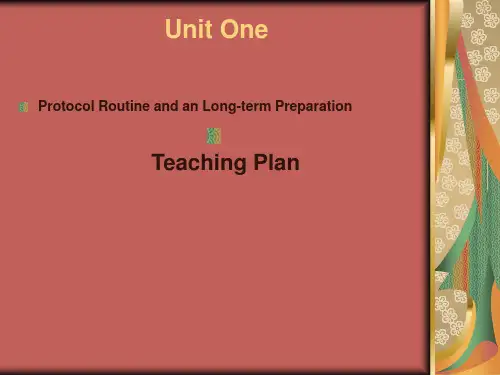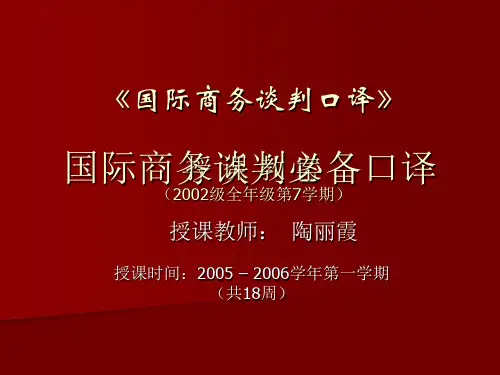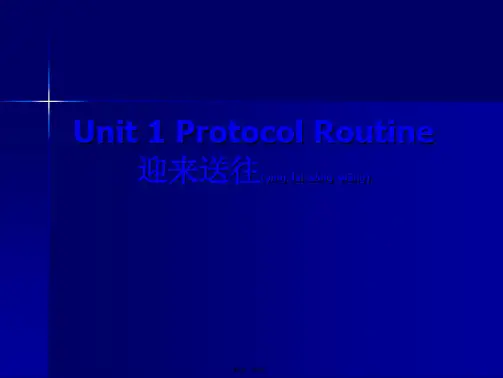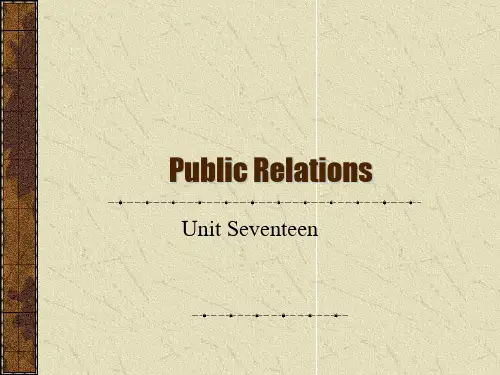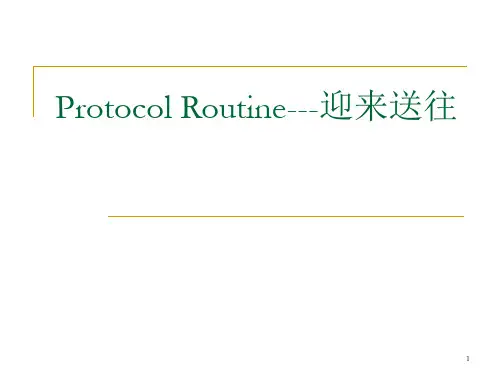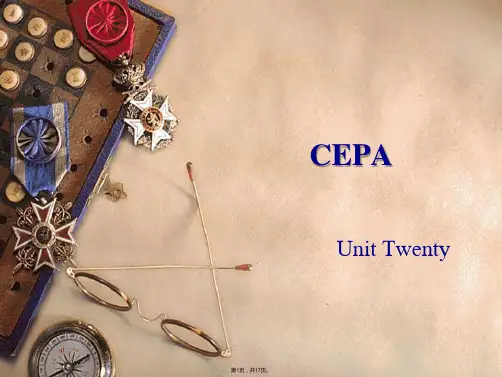Protocol Routine 商务现场口译课件20单元PPT
- 格式:ppt
- 大小:884.00 KB
- 文档页数:17

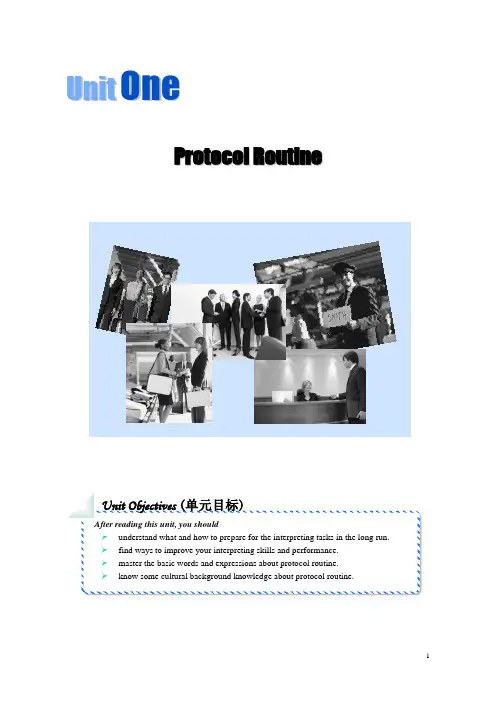
U n i t O n eP r o t o c o l R o u t i n eUnit Objectives (单元目标)After reading this unit, you should➢understand what and how to prepare for the interpreting tasks in the long run.➢find ways to improve your interpreting skills and performance.➢master the basic words and expressions about protocol routine.➢know some cultural background knowledge about protocol routine.PreparingI. Interpreting Skills (口译技能)Read the following presentation about long-term preparation and try tounderstand what and how to prepare for the interpreting tasks in the longrun. Then discuss with your partners the following questions:1. How do you usually prepare for a reception task?2. Is preparation necessary in interpreting? Why/Why not?3. What and how shall an interpreter prepare for a reception-interpreting task?4. What kind of interpreting skills do you think an interpreter should master?Preparing Training (I): Long-term Preparation(长期准备)Interpreting is a highly demanding profession. Interpreters only accept assignments for which they are qualified. If an interpreter accepts a task that is beyond their abilities, the resulting poor performance will surely reflect negatively on their client as well as themselves. In order to have a professional performance in interpreting, interpreters must be sufficiently prepared for their job. A well-prepared interpreter is usually confident and relaxed.Two Types of Pre-interpreting PreparationWith regard to the work of preparation, some must be prepared in the long run, while others can only be prepared shortly before the interpreting task is taken. In this sense, the pre-interpreting preparation can be divided into two types, namely long-term preparation(长期准备)and short-term preparation(短期准备).1. Long-term PreparationLong-term preparation means that interpreters shall be prepared every day for the potential interpreting tasks. It is essential for the successful career of a professional interpreter. For an interpreter, there is no point at which the work is finished. An experienced interpreter never stops preparing for the interpreting tasks! Preparation is an interpreter’s lifelong job. The more preparation they make, the better performance they will have.2. Short-term PreparationIn contrast with long-term preparation, short-term preparation is more direct and efficient. It refers to the job that can only be prepared shortly before the task is taken. After the interpreter is informed of an incoming interpretation task, they start their preparation immediately. Such preparation is highly necessary for the successful accomplishment of a certain interpreting task. In fact, the pre-interpreting preparation usually refers to the short-term preparation.What and How to Prepare in the Long RunProfessional interpreters may have the opportunity to work with a vast range of subjects. They may work for international organizations, private companies and trade unions as well as all types of meetings and conferences. In order to become a professional interpreter, they are required to have a strong sense of duty(责任感), a high level of linguistic proficiency(语言能力), wide encyclopedic knowledge (百科知识)and a good mastery of interpreting skills(口译技巧). These qualities are not achieved in one day and they deserve trainees’ continuous efforts in the long run.1. What to Prepare?Interpreters, therefore, should constantly make preparations for their jobs. An important task for an interpreter to prepare in the long term is the mastery of broad general knowledge and a large glossary. To complete an interpretation task, interpreters are also advised to improve their skills in decoding, message recalling and reconstructing. Interpreters must learn to listen actively, memorize the information effectively, and re-express the message smoothly. All these skills deserve interpreter s’life-long learning.2. How to Prepare?As for how to make long-term preparation for interpreting, it is advisable for the trainees to keep on practicing field interpreting(现场口译), reading widely and learning to collect information. As the saying goes, “Practice makes perfect.”Interpreters should do more interpreting exercises and grasp every chance to do field interpreting.They should also read widely to enlarge their vision and get more knowledge and information.II. Phrase Interpreting (短语口译)Work on the following words and phrases. Interpret them into Chineseand English respectively.A. English to Chinese1. Recover from the jet lag2. Thoughtful Arrangement3. Hospitability4. Souvenir5. Accommodations6.Claim baggage7. Proceed through the customs 8. Itinerary9. Farewell speech 10. Adjust to the time differenceB. Chinese to English1、为……设宴洗尘2、向……告别3、不远万里来到……4、您先请5、久仰大名6、欢迎辞7、赞美8、回顾过去9、展望未来10、慢走III. Sentence Interpreting (句子口译)Work on the following sentences. Interpret them into Chinese andEnglish respectively.A. English to Chinese1. I would like to extend, on behalf of the Chinese government and people and in my own name, ourcordial greetings and best wishes to your people.2.We are gathered here today with great pleasure to welcome Mr. Brown from ABC Company.3. It provides me with an excellent opportunity to meet old friends and make new ones.4.We are sorry that we shall be leaving. It is really a most interesting and rewarding visit.5. It was a real pleasure having you with us. We wish to thank you for coming.B. Chinese to English1. 斯密斯先生,欢迎您和代表团所有成员来我公司访问,愿你们访问愉快。


